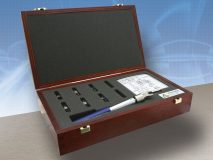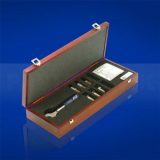 Coaxial calibration kits (Cal-kits), or vector network analyzer (VNA) coaxial calibration kits, are indispensable tools for ensuring that a VNA is providing the most accurate measurements possible. Without regularly calibrating a VNA with quality termination components, the conditions in which a device under test (DUT) is testing will also be included in the test data. If these conditions are well known, then the data can be refined with additional processing. However, any unknown factors will still corrupt the data.
Coaxial calibration kits (Cal-kits), or vector network analyzer (VNA) coaxial calibration kits, are indispensable tools for ensuring that a VNA is providing the most accurate measurements possible. Without regularly calibrating a VNA with quality termination components, the conditions in which a device under test (DUT) is testing will also be included in the test data. If these conditions are well known, then the data can be refined with additional processing. However, any unknown factors will still corrupt the data.
Hence, cal-kits are essential for removing the test cables, connectors, adapters, and other persistent influences from the valuable S-parameter, and other VNA, data taken at the point of calibration. Also, there are some cases where it may be beneficial to several high quality terminations for calibrating a DUT’s performance.
Commonly included in a coaxial calibration kit are precision shorts, opens, loads, and a thru adapter. These well-machined components are very different from typical terminations and standard adapters. The quality, impedance accuracy, and frequency performance of calibration kit terminations are generally vastly superior to standard terminations.
The shorts in a calibration kit “short” the energy emitted from the generators in a VNA, while an open appears as an unterminated transmission line end without allowing coupling and radiation to the external environment. The load in a calibration kit is chosen to match the transmission line and port impedance of the VNA and DUT. Lastly, the thru is a simple adapter that connects the two ports of a calibration kit, designed to be as close to an ideal transmission line as possible, hence invisible.
 Cal-kits come in a variety of standard coaxial connector sizes, with N-type being among the most common. Many millimeter-wave applications are also driving the use of much higher frequency calibration kits, such as 3.5mm cal-kits, which often perform to 26.5 GHz. To account for the diversity of DUTs and coaxial cables, precision adapter kits are also very valuable accessories to calibration kits. A particularly helpful adapter may be a male/plug and female/jack adapter, which can be used to adapt the gender of the calibration component to connector and DUT ports with different genders than the native cal-kit component. It is important for these adapters to be of high quality, or any performance degradations will reduce the effectiveness of a quality calibration kit.
Cal-kits come in a variety of standard coaxial connector sizes, with N-type being among the most common. Many millimeter-wave applications are also driving the use of much higher frequency calibration kits, such as 3.5mm cal-kits, which often perform to 26.5 GHz. To account for the diversity of DUTs and coaxial cables, precision adapter kits are also very valuable accessories to calibration kits. A particularly helpful adapter may be a male/plug and female/jack adapter, which can be used to adapt the gender of the calibration component to connector and DUT ports with different genders than the native cal-kit component. It is important for these adapters to be of high quality, or any performance degradations will reduce the effectiveness of a quality calibration kit.
Moreover, leveraging precision adapters, though expensive, is usually a more cost effective solution for handling the wear and tear of use, than subjecting the cal-kit components to repeated mate/demate cycles. Other useful accessories include precision coaxial test cables. There are many varieties of these cables, whose value comes from their ability to appear “invisible” to the test setup. Lastly, torque wrenches, which are often included in a calibration kit, allow for a user to make consistent matings between coaxial connectors, thus enhancing consistency and repeatability.
Fortunately, coaxial calibration kits often come with attractive cases, which are both durable and offer sport padded organization slots for holding the valuable calibration components and accessories. Along with the cases, dust caps for each end of the calibration kit components prevent ingress from dust, other particulates, and water from settling inside the coaxial connector of the components. Many technicians will use dust-free air sprayers or electronics grade alcohol cleaning kits to further ensure a contamination free connection. These cleanliness efforts may also extend the lifespan of a calibration kit by preventing marring of the inner surfaces of a connector by hard particles grinding inside the connectors during mating.




 Pasternack Blog
Pasternack Blog
